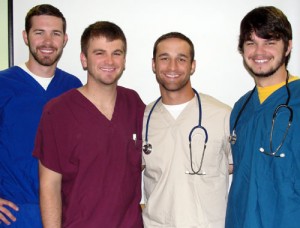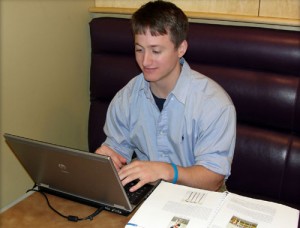If you need financial assistance, there are four basic types available: Scholarships, Grants, Student Loans, and Work-Study Programs. Scholarships do not have to be repaid and are awarded based on academic performance, financial need, ethnic origin, or other criteria. Grants do not require repayment and are based on financial need only. Student loans are available at low interest rates and repayment schedules depend on the type of loan received. Work-study programs provide part-time employment for students on or off campus during the school year and are usually awarded on the basis of need.
One of your best sources of information is the financial aid office of the school(s) to which you are applying or where you have been accepted. The financial aid office can provide information on scholarships, loans, and work-study programs available through the school(s). Information on the application procedures as well as the status of government loans can also be obtained through the financial aid office.
FEDERAL SCHOLARSHIPS AND LOANS
Federal scholarships and loans are based upon eligibility requirements and in most cases, financial need. Eligibility requirements include a high school diploma or GED; satisfactory academic progress; a statement of educational purpose; a minimum of half-time enrollment in an educational institution (some exceptions); a signed anti-drug abuse act certificate; and selective service registration. Specific federal programs are detailed below:
- Teach Grant Program — Provides grants of up to $4,000 per year to students who intend to teach in a public or private elementary or secondary school that serves students from low-income families. Students should contact the financial aid office at the college where you will be enrolled.
- Pell Grants – Federal scholarships available for qualifying undergraduate students who are enrolled at least half-time and are working toward their first associate or bachelor’s degree. A student can only receive one Pell Grant per year and award amounts are not standardized. Eligibility is based on need and is determined by a standard formula based on financial information reported on the application. Contact: Federal Student Aid Information Center; P.O. Box 84; Washington, DC, 20044; Phone: 800-433-3243.
- Academic Competitiveness Grant (ACG) – This grant is provided in combination with a federal Pell grant, and provides $750 for the first year of study and $1,300 for the second year.
- The National Science & Mathematics Access to Retain Talent Grant (National SMART Grant) – This grant is provided in combination with a Federal Pell Grant, and provides third and fourth year students of undergraduate study (or fifth year of a five-year program) to at least half-time students who are eligible for the Federal Pell Grant and who are majoring in physical, life, or computer sciences, mathematics, technology, engineering or a critical foreign language; or non-major single liberal arts programs. The student must also maintain a cumulative grade point average (GPA) of at least 3.0 in course work required for the major.
- Iraq and Afghanistan Service Grant — A student who is not eligible for a Pell Grant but whose parent or guardian was a member of the U.S. Armed Forces and died as a result of service performed in Iraq or Afghanistan after September 11, 2001 may be eligible to receive the Iraq and Afghanistan Service Grant.
- Federal Supplemental Educational Opportunity Grant (FSEOG) – Federal scholarships available for qualifying undergraduate students who show exceptional need and are working toward their first associate or bachelor’s degree. Funds are disbursed to schools each year and are used as a supplement to other grants. Awards are given based on Student’s need and the amount of funds available at the student’s particular school. The maximum amount awarded can vary between $100 and $4,000, depending on need and funds available. Eligibility is determined by the school. Students may attend school less than half-time. Contact: School Financial Aid Officer.
- Federal Perkins Loan Program – A campus based, low interest bearing loan program for undergraduate and graduate students with substantial financial need. Students have up to 10 years to repay the loan, with repayment beginning nine months after leaving school. Maximum amount borrowed can vary, depending upon financial need, when students apply, and funds available at the participating school. Students can borrow up to $6,000 for each year of undergraduate study but total borrowed funds cannot exceed $30,000. Contact: Federal Student Aid Information Center; P.O. Box 84; Washington, DC, 20044; Phone: 800-433-3243.
- Unsubsidized Stafford Loans – A loan with a variable interest rate that cannot exceed 10%, which the student does not need to exhibit financial need to apply. Students can defer payments as long as they remain enrolled full-time in school. Loans are available to full-time students working toward their first associate, bachelor’s, graduate, or professional degree. An unsubsidized loan means the student is responsible for paying all of the interest on the loan. Contact: Federal Student Aid Information Center; P.O. Box 84; Washington, DC, 20044; Phone: 800-433-3243.
- Stafford Student Loans – Variable interest rate loan program available through local banking institutions, or the Financial Aid Office. Loans are available to students who are enrolled in undergraduate, graduate, or vocational programs on at least a half-time basis and can demonstrate need. A student can borrow a Stafford loan to cover the remaining portion of funding needed after aid from other sources is subtracted. The student is not required to pay interest on the loan while in school or during the first six months after leaving school. Contact: Local lending institution, your school financial aid office, or the Federal Student Aid Information Center; P.O. Box 84; Washington, DC, 20044; Phone: 800-433-3243.
- Plus Loan – These loans are available to parents of dependent undergraduate or graduate students who are enrolled on at least a half-time basis. Parents are required to pass a credit check as well as other eligibility requirements to acquire a Plus Loan. Borrowers are not required to show financial need. The maximum borrowing amounts of Plus Loans vary based upon need and eligibility. Contact: Federal Student Aid Information Center; P.O. Box 84; Washington, DC, 20044; Phone: 800-433-3243.
- Federal Work-Study Program (FWS) – Give eligible undergraduate and graduate students the opportunity to work a part-time to help pay educational expenses. Jobs are usually provided in community service work or work related to the student’s curriculum. The maximum amount earned varies depending on financial need, time of application, and funds available. Contact: Federal Student Aid Information Center; P.O. Box 84; Washington, DC, 20044; Phone: 800-433-3243.
- Indian Tribal Grants Program and Indian Higher Education Grant Program. Contact: The U.S. Dept. of the Interior.
HEALTH PROFESSIONALS LOAN & SCHOLARSHIP PROGRAMS
- Primary Care Loan Program (PCL) – Provides long-term, low interest rate loans to full-time, financially needy students to pursue a degree in allopathic or osteopathic medicine. Students receiving a PCL Loan must agree to enter and complete residency training in primary care within four years after graduation and practice in primary care for the life of the loan. Contact: Federal Student Aid Information Center; P.O. Box 84; Washington, DC, 20044; Phone: 800-433-3243.
- Loans for Disadvantaged Students Program (LDS) – Provides long-term, low-interest loans to full-time, disadvantaged students based upon financial need, and their field of study. Funds are distributed through eligible health professions schools and students must purse a degree in medicine, osteopathic medicine, dentistry, optometry, pharmacy, podiatric medicine, or veterinary medicine. Amount may vary. Contact: Federal Student Aid Information Center; P.O. Box 84; Washington, DC, 20044; Phone: 800-433-3243.
- National Health Service Corps Loan Repayment Program (NHSC) – Health training loan repayment scholarships for students willing to work in an area where there is a shortage of health professionals. Applicants must be enrolled in an accredited health professional program or have a health professions degree. Contact: National Health Service Corps; Bureau of Primary Health Care; Rockville, MD 20857.
- National Health Service Corps Scholarships (NHSCS) – Requires students to provide service in a manpower shortage area upon graduation. Students eligible for scholarships must major in dentistry medicine, nursing, nutrition, optometry, osteopathy, pharmacy, podiatry and veterinary medicine. Contact: Federal Student Aid Information Center; P.O. Box 84; Washington, DC, 20044; Phone: 800-433-3243.
- Nursing Student Loan Program (NSL) – Provides long-term, low-interest loans to full-time and part-time students who have a financial need and are pursing an associate, baccalaureate or graduate degree in nursing. Funds are given to nursing schools and students can borrow a set amount each year up to $13,000 throughout their studies. Contact: Federal Student Aid Information Center; P.O. Box 84; Washington, DC, 20044; Phone: 800-433-3243.
- Scholarships for Disadvantaged Students (SDS) – Provides scholarships to full-time, disadvantaged students with financial need who are enrolled in health professions and nursing programs. Eligible accredited programs include, schools of medicine, osteopathic medicine, dentistry, optometry, pharmacy, podiatric medicine, veterinary medicine, nursing (diploma, associate, baccalaureate, graduate), public health, allied health (Baccalaureate and graduate degree programs in dental hygiene, medical laboratory technology, occupational therapy, physical therapy, radiologic technology), and graduate programs in clinical psychology. Contact: Federal Student Aid Information Center; P.O. Box 84; Washington, DC, 20044; Phone: 800-433-3243.
STATE SCHOLARSHIPS AND LOANS
- Louisiana Dept. of Health & Hospitals Loan Repayment Program – Provides loan repayment to primary care physicians, dentists, psychiatrists and mid-level health professionals (nurse practitioners, midwives, physician assistants) in return for a 2-3 year commitment to practice in a designated underserved area.
- DHH Office of Mental Health – Offers stipends for psychiatric residents who agree to practice in a state mental health facility. Contact: Loan Repayment Program Coordinator; Louisiana Dept. of Health & Hospitals; P.O. Box 1349; Baton Rouge, LA 70821-1349; or Phone: (225) 342-4702.
- Louisiana Tuition Opportunity Program for Students (TOPS) – Pays in-state tuition for students who achieve a 2.50 grade point average with 17.5 Core Units and an ACT composite Score of 20 contact: Louisiana Office of Student Financial Assistance; Baton Rouge, LA 70821-9202; 800-259-5626
- Leveraging Educational Assistance Partnership (LEAP) – Formerly referred to as SSIG, the LEAP uses federal and state funds to provide need-based grants to academically qualified students. Students must meet have a grade point average of 2.0, an ACT Score of 20, and substantial financial need. Contact: Louisiana Office of Student Financial Assistance; Baton Rouge, LA 70821-9202; 800-259-5626.
COLLEGE SCHOLARSHIPS AND LOANS
For further information about financial aid that may be available, write to the college or vocational school that you plan to attend. If you are attending a large college or university you should also write to the specific school or department because they often have special financial aid funding for their students.




